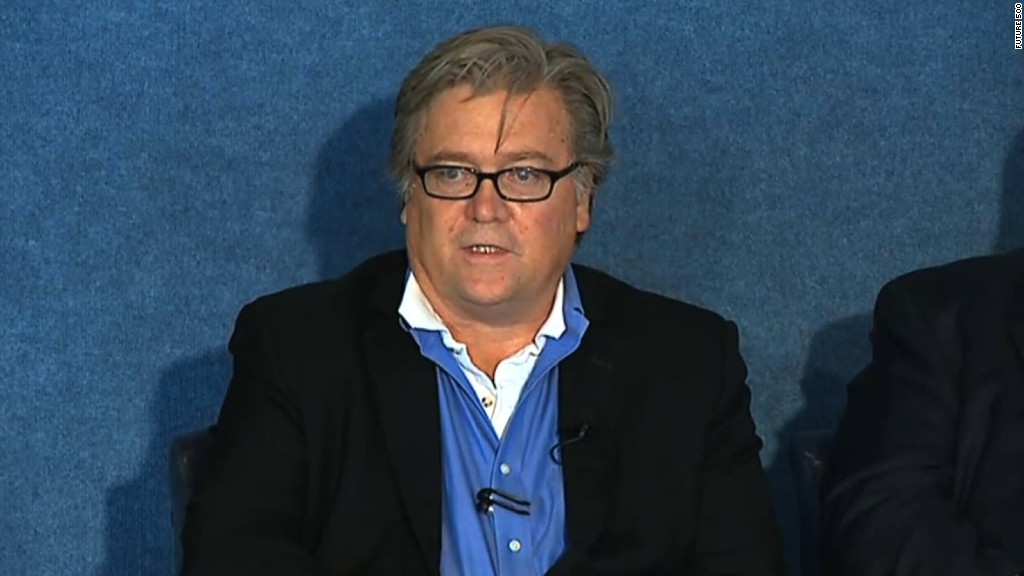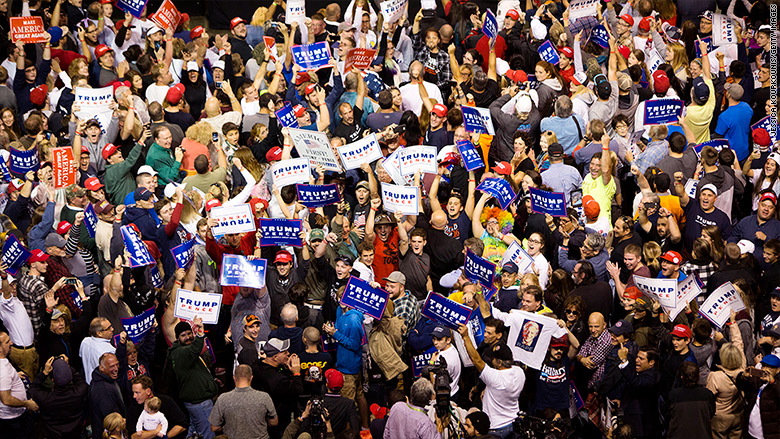
Donald Trump on Thursday railed against a conspiratorial plot by the Democrats, corporations and the mainstream media; renewed calls for the imprisonment of his political opponent; and portrayed himself as a populist hero battling a globalist elite.
To casual observers, such rhetoric might be seen as a sign that he is lashing out amid falling polls and reports of women accusing him of inappropriate physical advances. But to people watching closely, the worldview he espoused bore the clear mark of Steve Bannon, his campaign's CEO, and Breitbart News, the right-wing outlet of which Bannon was the chairman before taking leave to work for Trump.
Two years ago, just 15% of Americans had ever heard of Breitbart -- a populist, right-wing website that makes no apologies for its agenda-driven reporting -- and a mere 4% said they trusted it, according to a Pew Research Center survey. Today, Breitbart claims a bigger digital audience than every other conservative outlet with the exception of Fox News and Drudge Report. It is the favored outlet for Donald Trump's core supporters, and Bannon, as Trump campaign CEO, has become a key driving force in this election.
"The core principles that drive Breitbart seem to be gaining popularity," Alex Marlow, the editor-in-chief of the Breitbart News Network, told CNNMoney. "There is a movement."
Related: Meet the 30 year old running Breitbart News
"Regardless of what happens to Trump on November 8, this movement is not going away," a source close to Breitbart said. "This is the first inning."
As Thursday's speech showed, Trump has fully embraced the Breitbart worldview, which means nationalist talking points and anti-liberal narratives once reserved for the far-right echo-chamber have now found a hearing in the national discourse, and even at the presidential debates watched by tens of millions Americans.
Those narratives will almost certainly not be going anywhere after the election, even if Trump loses, and Breitbart -- or at the very least its spirit -- will be the primary voice behind them.
"There are thousands of ways in which this campaign is a merger between Donald Trump and Breitbart," Ben Shapiro, a former editor-at-large at Breitbart who has become a vociferous critic of the site, told CNNMoney. "Breitbart's whole goal was to burn everything down... and Trump has gone full Breitbart."
What can be mystifying to Americans who do not identify with or trust Breitbart is why so many people willingly believe news sources that have a stated partisan agenda, ignore critical stories about Trump and, in some cases, advance falsehoods, unfounded narratives and conspiracy theories -- and at the same time willingly disregard so much of what comes out of mainstream media as categorically false or biased.
For decades, conservatives have fueled the perception that the mainstream media is squarely on the side of the liberal elite. This perception grew stronger with the rise of talk radio in the 1990s, the launch of Fox News in 1996 and the proliferation of conservative websites over the last decade. Today, just 14% of Republicans express trust in the media, according to Gallup.

Related: Fueled by Republicans, Americans' trust in media hits all-time low
But even some conservatives who are critical of the media at large say outlets like Breitbart have taken the perception of liberal media bias and driven it overboard, to the point where their readers are simply unwilling to accept basic facts if they don't comport with their worldview.
"There was this effort to respond to media bias, both real and perceived, that meant discrediting mainstream journalistic institutions, but it's got to the point where people don't trust anything," one Fox News source said. "It's mind-blowing. You can play an unedited video for two minutes that includes Trump contradicting all of these things to make your point --- and they insist that the video is doctored. It's really extraordinary."
"In the regular conservative movement, Breitbart is a laughing stock," said Shapiro. "It's all spin. It's a propaganda outfit."
Nothing fuels the Breitbart contingent more than the sense that the mainstream media is working with Democrats, American corporations and a feckless Republican establishment to undermine the American middle class in order to benefit a globalist establishment.
In the Breitbart worldview, the mainstream media is just as agenda-driven and prone to bias and falsehoods as right-wing media -- it's just that the mainstream media doesn't acknowledge it.
Related: Conservative media heavyweights at war over Donald Trump
"This is a group of people serving the same agenda," Marlow said.
Trump echoed those remarks in Thursday's speech: "The establishment and their media enablers wield control over this nation through means that are very well known," he said.
That agenda, Bannon and Breitbart's fiercest partisans believe, is the advancement of open borders, free trade and progressive poliicies at the expense of American sovereignty. "Liberal vs. Conservative" no longer adequately describes the partisan divisions at play in American politics today, Marlow said. The real battle is between populists and globalists.
"This is a response to open borders, immigration, the sense that the global elite are taking advantage of the system at the expense of ordinary people, normal people, and American values," Marlow said. "It's less about the left-right dichotomy, and more along the lines of globalists and elitists versus populists and nationalists."
For those who believe the mainstream media is in cahoots with globalists, there can be little reason to take anything they report, say or broadcast seriously. It has been totally delegitimized.
"This is the journalism of affirmation, not verification," Tom Rosenstiel, the executive director of the American Press Institute, said of right-wing news sites. "It's designed to reaffirm what you're thinking."
Leon Wieseltier, the veteran literary critic who now serves as the Isaiah Berlin Senior Fellow in Culture and Policy at the Brookings Institution, said readers' willingness to believe falsehoods and ignore inconvenient truths was a result of the pain brought on by economic dislocations like globalization and digitalization.
"Populism is another word for the rise of emotionalism in politics, and once politics enters the realm of emotions, it leaves the realm of reason and civility and you get this volatile mess that we're in," Wieseltier said. "Right now the emotional satisfaction that some of the right-wing propositions give are a lot more attractive than their truth value."
"Fact-checking is beside the point for people whose views are unfalsifiable," he continued. "You get the sense that for a large part of the population, their reality has been impaired."
To Breitbart's champions, of course, these are just elitist, left-wing talking points.
"Breitbart became the voice for populist nationalism. Some people think that's a crazy position, but if it's crazy, then there are millions of crazy people," said Patrick Caddell, the pollster and political consultant who frequently appears on Breitbart's SiriusXM show.
Marlow, too, thinks the liberal elite totally underestimates the breadth of the movement.
"We are shifting the conversation in the country to things that are in line with our values," he said. "Populism and nationalism is coming back."


